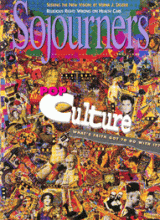No mistake about it, there is a revolution going on in the way people communicate and receive information in this country. Conventional media outlets are suffering drastic declines in their constituency. The percentage of people under 35 who say they "read a newspaper yesterday" plunged from 67 percent in 1965 to 30 percent in 1990. The same age group admits getting one-third of its political information from late-night entertainment shows.
But it is not just the young who are tuning out network news in favor of cable channel-surfing (perhaps catching snippets on CNN in between TV sitcoms) or who turn to the movies for help in making some sense of their personal lives. Increasingly, the lingua franca of U.S. social life is popular culture: politics, personal expression, and entertainment all rolled into one.
Though many of us might grieve these changes, none of us can afford to ignore them. Religious and political movements now must communicate and influence in their wake. If they do not, they risk losing a generation, and perhaps eventually maybe even a voice. Popular culture is here to stay; just wait, the "information highway" will soon run straight through your living room!
Our feature section is self-consciously a construction of popular culture. (Could it be otherwise? Rule #1 of pop culture: "The medium is the message.") The "frame of the house" is a dialogue between myself and Bill Smith, an African-American gay liberationist. We "sample" a diversity of images, voices, lifestyles, attitudes, political rhetoric, and public events. Into our dialogue will be spliced remarks from a host of voices who will add rooms, bend 2 by 4s, tear down walls, embellish designs, and tighten the structure Bill and I have pieced together.
Read the Full Article

